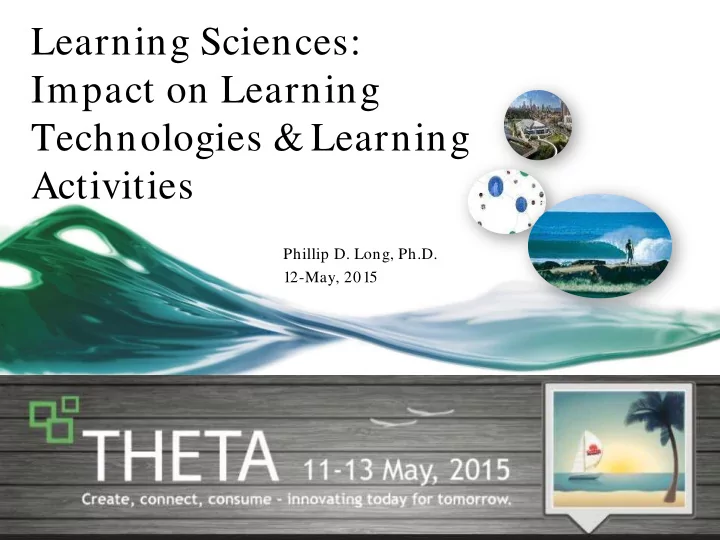

Learning Sciences: Impact on Learning Technologies & Learning Activities Phillip D. Long, Ph.D. 12-May, 2015
Narrative Arc ( 5 ± 2) Conclusion: What do we want?
Learning • learning |ˈlərniNG | noun the acquisition of knowledge or skills through experience, study, or by being taught: these children experienced difficulties in learning | [ as modifier ] : an important learning process . • knowledge acquired through experience, study, or being taught: I liked to parade my learning in front of my sisters . ORIGIN Old English leornung (see learn, -ing 1 ) . • Learning reflects the relatively permanent changes in behaviour or knowledge that support long-term retention & transfer (Soderstrom & Bjork, Perspectives in Psychological Sciences, 2015, vol. 10(2) 176-199
What does this mean? • “The ability to use information available in any particular context, referred to as retrieval cues, to reconstruct knowledge in order to meet the demands of the present activity .”
Performance vs. Learning • The temporary fluctuations in behaviour or knowledge that can be observed & measured during or immediately after the first acquisition process. (ibid. Soderstrom and Bjork) o Latent learning o Overlearning o Fatigued learning
Performance vs. Learning 1. Learning can occur when there are no d iscerna ble cha nges in perform ance are observed 2. Im provem ents in perform ance can fail to yield significant learning. 3. Certain m anipulations can have op p osite effects on learning & perform ance
Spaced Practice Methodology (Rohr & Paschler)
Study gap vs. test delay vs. test score Rohr & Pascler (2010), After Cepeda. et. al. (2008)
Variable (Interleaved) vs. consistent practice 1:2 test 1:1 Study in same room twice or different room each time & test in a third room
Sample Geometric Solid r A wedge is the cross-hatched portion of the tube. Its bottom is a circle, & its top is a slanted oval. Its volume =r 2 hπ/2 h
Methodology Week 1 Week 2 Week 3 Mixers Set 1 Set 1 test interleaved interleaved Blockers Set 1 Set 2 test grouped grouped
Accuracy during practice
Accuracy during testing
We know a lot about what makes for effective study/ testing patterns. The question is: do we want better test scores, or better learning?
One of the painful things about our time is that those who feel certainty are stupid, and those with any imagination and understanding are filled with doubt and indecision. - Bertrand Russell (1951)
metacognition |ˌmetəˌkägˈniSHən | noun Psychology awareness and understanding of one's own thought processes. DERIVATIVES metacognitive |- ˈkägnətiv | adjective
Lake Woebegone Effect Where all the men are strong, the women are good looking and the children are above average
Cerego
UTAustin X
Smart Sparrow
A synopsis of the current state of personalised learning tool, as of March, 2015. http:/ / www.sr.ithaka.org/ research- publications/ personalizing-post- secondary-education TinyURL: http:/ / tinyurl.com / m c6q3 er
Learning Tools The Rise of LTI Interoperability
Where are all the Apps? In App Stores
But we need a And that’s true of federated store for LTI Apps, too University Written LTI Apps, Too! CASA= community app store architecture https:/ / github.com/ ucla/ casa-on-rails http:/ / imsglobal.github.io/ casa/
Hoot.me – Turning Facebook into Study Mode
Social Network Support Become an “Owl”- tutor others
Closing Thoughts 1. New digital tools are decomposing once integrated systems learning systems
2. How are you connecting where your students are ‘hanging out’ digitally and where your academic staff are teaching?
3. Where do you stand on the spectrum between adaptive tools, & personalised learning tools?
“Give me a log hut with only a simple bench , Mark Hopkins on one end, and I on the other, and you may have all the buildings, apparatus, and libraries, without 4. Is this your him” ideal learning President James Garfield environment?
5. Why aren’t you proactively developing your own learning app store that represents good learning science theory in elegant learning tool design that fits your institutional culture?
Thank you. Twitter: radhertz Email: phil.long@austin.utexas.edu
References Brown, J. (2015). Personalizing Post-Secondary Education: An Overview of Adaptive Learning Solutions for Higher Education. Ithaka-SR, 34 pgs. Cross P. Not can but will college teaching be improved? New Directions for Higher Education 1977;17:1–15. Cepeda, N. J., Pashler, H., Vul, E., Wixted, J. T., & Rohrer, D. (2006). Distributed practice in verbal recall tasks: A review and quantitative synthesis. Psychological Bulletin, 132, 354–380. Dunning D, Johnson K, Ehrlinger J, Kruger J. Why people fail to recognize their own competence. Current Directions in Psychological Science 2003;12:83–87 Erhlinger, J., Johnson, K., Banner, M., Dunning, D., & Krueger, J. (2008). Why the Unskilled Are Unaware: Further Explorations of (Absent) Self-Insight Among the Incompetent, Organ. Behav Hum Decis Process, 105(1): 98–121. doi:10.1016/ j.obhdp.2007.05.002 Nathan, M.J., & Sawyer, R.K., (forthcoming). Foundations of the Learning Sciences, in R. K. Sawyer (Ed.). The Cambridge Handbook of the Learning Sciences (Second Edition) (Chapter 2). Cambridge University Press: Cambridge, England, UK. Rohr, D., Paschler, H. (2010). Recent Research on Human Learning Challenges Conventional Instructional Strategies. Educational Reascher, 39: 406. DOI: 10.3102/ 0013189X10374770 Rohrer, D., & Taylor, K. (2007). The shuffling of mathematics practice problems boosts learning. Instructional Science, 35, 481–498. Soderstrom, N. C., & Bjork, R. A. (2013). Learning versus performance. In D. S. Dunn (Ed.), Oxford bibliographies online:Psychology. New York, NY: Oxford University Press.
Recommend
More recommend